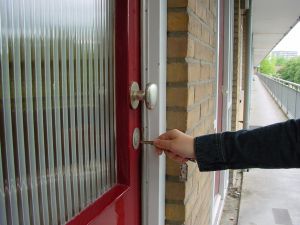Posted by Teresa on May 30, 2012 under Lease and Rental Agreements | 
 The still-slow economy means vacationers are looking for ways to save money, and everyone else is looking for ways to make it. Put them together, and you have strong growth in vacation rentals—and not just beach houses. Ordinary rental homes and apartments are desirable by travelers and tourists alike who prefer to avoid high rates and fees charged by hotels for everything from parking to WiFi.
The still-slow economy means vacationers are looking for ways to save money, and everyone else is looking for ways to make it. Put them together, and you have strong growth in vacation rentals—and not just beach houses. Ordinary rental homes and apartments are desirable by travelers and tourists alike who prefer to avoid high rates and fees charged by hotels for everything from parking to WiFi.
Some “hosts” vacate their apartments and turn the entire unit over to their “guests,” while others rent just a couch or spare room—and take on temporary roommates. Most have not considered reviewing their leases to make sure this situation is even allowed. And it probably isn’t, considering that “no subletting without landlord approval” is a common clause in most rental agreements and leases.
As summer vacation season kicks off, what can landlords do to prevent unknown, unscreened strangers from staying in their properties without their consent?
- Send out a friendly reminder to all tenants that subletting without your permission is not allowed—whether it’s temporarily turning over the entire rental to a third party, or renting out a part of it.
- Explain your concern for the safety of all tenants, who would be at risk if your tenant screening procedures were not followed for everyone residing on your property—even temporarily.
- Notify tenants that anyone violating the policy is subject to eviction.
Your rental property is yours alone to profit from. You have the responsibility for maintenance, repairs, paying taxes and keeping tenants safe. Your tenants do not have the right to rent out your property and profit from your investment, unless you condone it. Make sure that your leases include a no-subletting clause—and that you uniformly enforce it.
Posted by Teresa on May 23, 2012 under Legal | 
 In the wake of the Treyvon Martin shooting earlier this year, rental property owners and managers are rightly concerned about possible liability for actions taken by tenant watch or apartment watch groups on their properties.
In the wake of the Treyvon Martin shooting earlier this year, rental property owners and managers are rightly concerned about possible liability for actions taken by tenant watch or apartment watch groups on their properties.
In a case that made headlines everywhere, 17-year-old Martin was shot and killed by a neighborhood watch leader while visiting his father, who lives in the community. Evidence keeps coming out, but it is unknown what exactly happened that day. The shooter, George Zimmerman, has been charged with second-degree murder.
The circumstances around the shooting have many wondering who is liable for Zimmerman’s actions? Was he sanctioned by the homeowners association in the community? Will the individual homeowners be subjected to a lawsuit and paying damages? And if something like this happened on a rental property, would the owner be liable for a tenant watch group’s actions?
It’s a tough call. In many communities, the police have encouraged citizens to form crime watch, neighborhood watch and tenant watch associations to discourage and report crime in their communities. Many of these groups were formed with the help of the local police.
The inherent risks in sponsoring or advocating for a tenant watch group can be mitigated by including the local police department for guidance and training, as well as by consulting with an attorney who specializes in homeowners and community associations. It’s also important to create a process of recruiting only responsible volunteers who will follow procedures, and screening each potential volunteer.
Establishing procedures for reporting suspicious activity and keeping safe are vital for success and safety, and “do not engage” and “no guns allowed” rules are the most important. In the Martin case, Zimmerman was told to remain in his car, but ignored that directive from the police dispatcher.
Still, a landlord or property manager cannot prevent accidents or lapses in judgment. And in the Martin case, if Zimmerman is found guilty, it’s likely a lawsuit against the community’s homeowner association and property management company will follow.
Could the same thing occur in your duplex, rental home or apartment complex? If you want to avoid liability, then perhaps hiring a private security firm is the better way to go.
Legal disclaimer:
The contents of this article are intended for general information purposes only, and should not be relied upon as a substitute for obtaining legal advice applicable to your situation.
No matter how competitive your rents are, you need to protect your rental property and assets with tenant background checks. Proper tenant screening will ensure you are leasing to the best possible tenants.
Posted by Teresa on May 20, 2012 under Rents and Deposits | 
 Our last post covered ways to incentivize tenants to pay rent online. One reader asked for a list of online rent payment services. So we’ve rounded up a list of popular online rent payment services, along with what makes each one unique.
Our last post covered ways to incentivize tenants to pay rent online. One reader asked for a list of online rent payment services. So we’ve rounded up a list of popular online rent payment services, along with what makes each one unique.
RentPayment – This company says it’s the largest electronic payments processor in the multifamily industry. RentPayment was founded in 1999 and has since acquired a couple of competitors along the way. The company offers credit card and debit card rent payment on their website. Tenants can also pay rent by phone, by using the company’s iPhone app, or by text. Tenants who sign up for RentByText get monthly text reminders when rent is due. They simply reply “Pay,” and their rent is automatically paid via their debit/credit card or through an e-check. Property managers collecting paper checks can use RentPayment’s check scanning services to capture check images digitally, and then deposit them without leaving the office.
RentPayment’s extensive marketing efforts are intended to increase use of its services. They offer magnets, brochures, posters and signs to help spread the word about the advantages of paying rent online through their services.
Pricing: The monthly fee is $9.95 to set up accepting e-check payments through RentPayment, which includes 10 e-check transactions. Funds are deposited into your bank account within one or two business days. Tenants may pay online for free. Additional e-checks are $1.00 each. The fee to accept credit cards is 2.95% of the total amount. Debit cards are 1% of the total amount. Tenants may pay online, by phone, or text for free.
PayLease – PayLease also offers rent payments via e-checks and credit cards, either one-time or recurring. They also offer the means for property managers to make payments into the building owner’s bank account. Another unique feature of PayLease is an integrated online lease application system. Prospective tenants may submit an application and pay the application fee at the same time. Property managers are notified via email that a new application has been submitted.
Tenants may pay rent online or over the phone. Email reminders are also avaialable.
Pricing: PayLease allows rental property owners to pay the transactions fees for online payments, or pass the fee along to tenants. The company also offers a rebate program. The more online payments tenants make, the bigger the rebate. Monthly and/or transaction fees are priced individually.
PayYourRent – PayYourRent was developed by property managers. They offer rent and security deposit payment processing by e-check or credit card, along with additional automatic management services, such as maintenance requests, rental applications, utility connections and check scanning. PayYourRent also offers a payment portal that you can customize with your company’s logo, address and other information.
Pricing is provided upon request. Tenants may pay rent online. PayYourRent offers 24-hour payment processing, so funds are available more quickly.
eRentPayment – eRentPayment allows property managers to collect rent, application fees and security deposits online. Tenants may pay rent online each month, sign up for recurring automatic payments or pay by phone. Managers may also refund security deposits to tenants through the service. Rent payments submitted late are automatically charged a late fee, and managers/owners have the option of blocking partial payments. There are no extra fees to use multiple bank accounts.
eRentPayment offers a solution for tenants without Internet access, as well. Managers may submit a form, signed by the tenant, authorizing an automatic monthly debit from their bank account. Tenants may not alter the payment without submitting another application.
Pricing: Each transaction is $3.00. Property owners and managers may choose to pay the entire transaction fee, split it with the tenant, or have the tenant pay the fee. eRentPayment also offers vacancy listings for no charge.
Posted by Teresa on May 15, 2012 under Landlord and Tenant FAQs, Rents and Deposits | 
 As we reported back in March, some landlords and management companies are forcing tenants to pay rent through online services. Many question whether this is legal or not. The suit filed by the residents of Woodlake Manor Apartments is still moving through the court system, so it’s too soon to tell how that will shake out. But in the meantime, how can you convince tenants to switch over to online rent payment? And is it worth it?
As we reported back in March, some landlords and management companies are forcing tenants to pay rent through online services. Many question whether this is legal or not. The suit filed by the residents of Woodlake Manor Apartments is still moving through the court system, so it’s too soon to tell how that will shake out. But in the meantime, how can you convince tenants to switch over to online rent payment? And is it worth it?
Having rent payments flow automatically into your bank account can be convenient. Collecting checks, posting them in your accounting software, depositing them in the bank (or having your bookkeeper do it) takes time you could be spending on growing your business—or better yet, doing something fun.
Plenty of landlords receive rent payments through a variety of online tools—and neither they nor their tenants would go back to paper checks for anything. It seems most people you know do all their banking and bill paying online. So why not convert your tenants over to online rent payment?
Maybe your tenants won’t or can’t use online services. Perhaps they don’ t all have computers at home. Or they won’t take the time to learn how to use online services. If you are ready to be done with paper checks, maybe it’s time to help them move into the 21st century.
Try incentivizing tenants to transition to online rent payment with these step-by-step ideas:
- Send out a notice to all tenants that you are now offering online rental payment.
- List the benefits, such as avoiding writing and mailing a check, finding a stamp and sending the rent several days in advance of the due date. Online payments are more convenient: rent can be sent electronically on the due date. Tenants can schedule payments ahead of time to cover travel or vacations. Checks can’t get lost in the mail. And, it saves paper!
- Offer a one-time $10 or $25 gift card for tenants who sign up right away for online rent payment.
- You will be notified which tenants choose the online option.
- For those who choose not to use online payment, inform them that beginning with their next lease renewal, you will be requiring them to do so.
- If they still balk, give them the option of paying the entire new rent at renewal (whatever amount you would normally raise the rent) or a lowered amount for paying online.
Landlords may not be able to force all tenants to pay rent online. There will likely be situations where a tenant can’t get to a public library to use a computer, or is not able to understand how to use online banking. And tenants with disabilities are protected under law. Be reasonable and flexible, and collect rent online to the extent that you can.
Protect your rental property and assets through tenant background checks. Proper tenant screening will ensure you are leasing to the best possible tenants.
Posted by Teresa on May 10, 2012 under Legal | 
 Under Title X, or the Residential Lead-Based paint Hazard Reduction Act, landlords are required to disclose any known lead-based paint or hazards in their rental property before signing or renewing a lease with a tenant.
Under Title X, or the Residential Lead-Based paint Hazard Reduction Act, landlords are required to disclose any known lead-based paint or hazards in their rental property before signing or renewing a lease with a tenant.
The law was enacted in 1992 to reduce the health threats of lead-based paint to adults and children. When lead-based paint peels, chips or is sanded, it can lead to lead poisoning, which affects nearly every system in the body. Infants and young children are particularly susceptible. Lead poisoning can lead to behavior problems, impaired growth and reading and learning problems. The Centers for Disease Control (CDC) estimates 250,000 U.S. children ages one through five have elevated blood lead levels.
Adults with lead poisoning often have high blood pressure, memory problems, joint and muscle pain, nerve disorders, and problems during pregnancy.
It’s clear that following the law is important, and the right thing for landlords to do. Landlords are required to tell prospective tenants about the location and condition of lead-based paint in housing built before 1978. They are also required to provide information, such as pamphlets provided by the CDC, about lead paint hazards and how to prevent exposure. Tenants may then make an informed decision about renting or not.
Recently, a landlord in Bridgeport Conn. was found to have rented apartments to families on seven different occasions without making the necessary disclosures. The landlord was charged with:
- Failing to give tenants the required information pamphlets.
- Failing to include proper warning statements in the leases.
- Failing to disclose any known lead-based paint or paint hazards.
- Failing to provide records or reports on previous lead paint enforcement actions or violations.
The landlord is now facing a federal fine of up to $127,000 for his carelessness.
In Indianapolis, Ind., the chipping lead-based paint in a rental home led to serious health issues for a three-year-old. The child came down with a fever, stopped talking, slept constantly and could not eat. A medical exam revealed lead poisoning.
In 2007, the county health department tested the home and found hazardous levels of lead in the doors, door frames, window frames and other areas. Inspectors recommended what needed to be done to bring the home into compliance. The owner of the property at that time was First National Bank of America. The home was tested again in 2009, and a letter was sent to the new owner, a private landlord, outlining that all of the lead hazards had not been corrected.
The tenant started renting the home a year ago, and asserts she knew nothing of the dangers. Doctors told her to vacate the house as soon as possible. She is now in the process of moving, but fears the home will be rented to another unsuspecting tenant. The landlord of this property could face the same charges and fines as the Bridgeport landlord.
Lead poisoning is serious—and so are the laws landlords are required to follow to keep their tenants safe. Don’t make the same mistakes as these two landlords. Protect your tenants and yourself by following Title X to the letter.
Posted by Teresa on May 2, 2012 under Landlord Tips | 
 Rental property owners have the responsibility to provide their tenants with safe and habitable housing. Not only is it the law, but focusing on safety can prevent accidents and other problems that can lead to crime on your rental property, injuries for tenants and visitors, and lawsuits for landlords.
Rental property owners have the responsibility to provide their tenants with safe and habitable housing. Not only is it the law, but focusing on safety can prevent accidents and other problems that can lead to crime on your rental property, injuries for tenants and visitors, and lawsuits for landlords.
Here are some safety guidelines for every landlord and property manager:
- Conduct regular property safety inspections. Check for leaking pipes, broken windows, broken or rotted stair treads, and damaged wood on railings, balusters and decks. Inspect electrical wiring and make sure smoke and CO2 detectors are installed according to building codes and are in operating order.
- Perform preventative maintenance. Fix what needs to be fixed, especially things that cause a safety hazard, like tripping hazards, broken locks or unsafe railings.
- Provide fire extinguishers for each rental unit. Educate tenants on escape routes in case of a fire.
- Take care of broken tree limbs, snow and ice immediately. Clean up piles of fallen leaves, especially on the stairs, where they can cause slipping.
Preventing crime is everyone’s responsibility. To discourage criminal activity, tenants should:
- Keep vehicles locked and avoid leaving items in them in plain sight.
- Never leave valuables in vehicles.
- Observe their surroundings and report any suspicious activity, persons or vehicles.
- Remind tenants that they are responsible for the actions and behavior of all their guests.
- Never copy keys.
- Not allow strangers into a building with controlled access doors. Have them contact the person they are visiting.
Landlords and property managers should:
- Keep parking areas, sidewalks, common areas and stairwells well lit. Ask tenants to inform you of any burned-out lights.
- Provide properly locking doors and windows.
- Trim shrubs and trees around windows.
- Communicate with tenants. Ask about any potential crime or safety problems.
- Regularly inspect properties for signs of potential criminal activity.
- Include a clause in the lease that states tenants will be evicted for dealing, selling or manufacturing drugs on the property, or for allowing such activity by others.
- Screen all prospective tenants. Run a criminal background check on each applicant, so you know that they are who they say they are. Tenant screening will help keep violent criminals or sex offenders out of your rental property, and will help keep everyone safer.
 The still-slow economy means vacationers are looking for ways to save money, and everyone else is looking for ways to make it. Put them together, and you have strong growth in vacation rentals—and not just beach houses. Ordinary rental homes and apartments are desirable by travelers and tourists alike who prefer to avoid high rates and fees charged by hotels for everything from parking to WiFi.
The still-slow economy means vacationers are looking for ways to save money, and everyone else is looking for ways to make it. Put them together, and you have strong growth in vacation rentals—and not just beach houses. Ordinary rental homes and apartments are desirable by travelers and tourists alike who prefer to avoid high rates and fees charged by hotels for everything from parking to WiFi.




